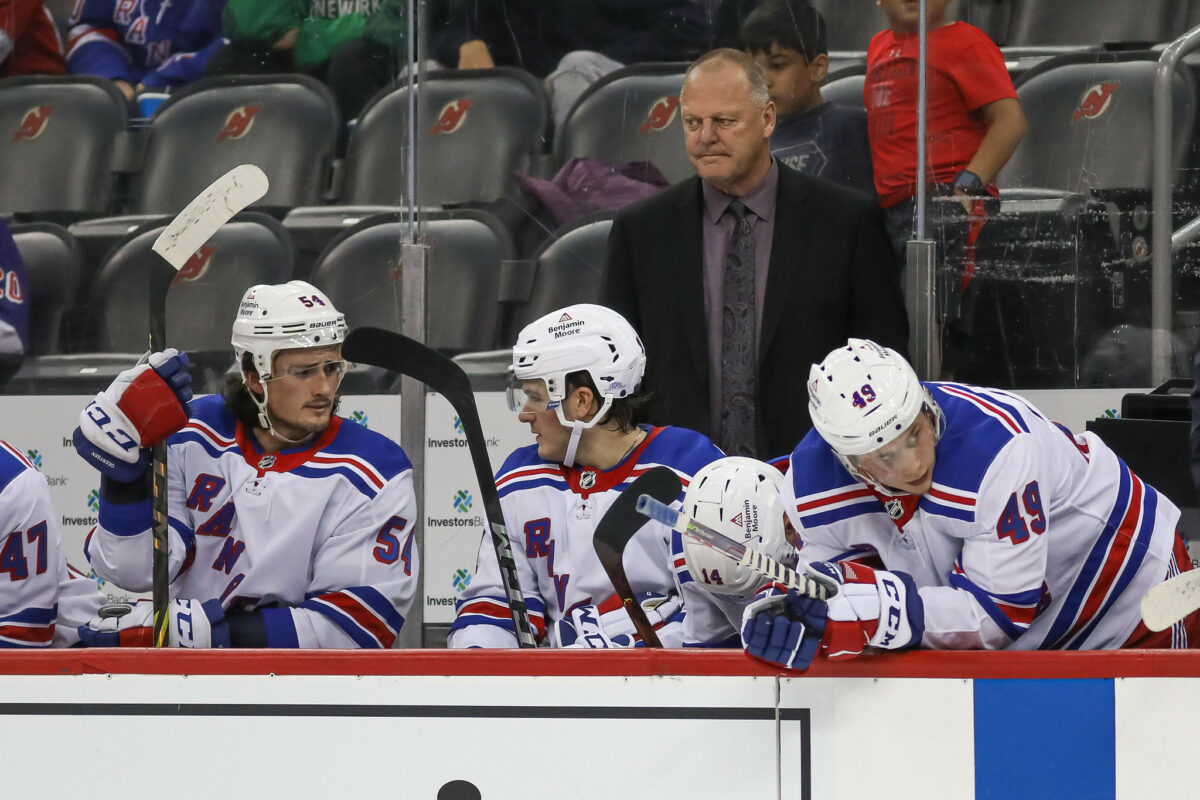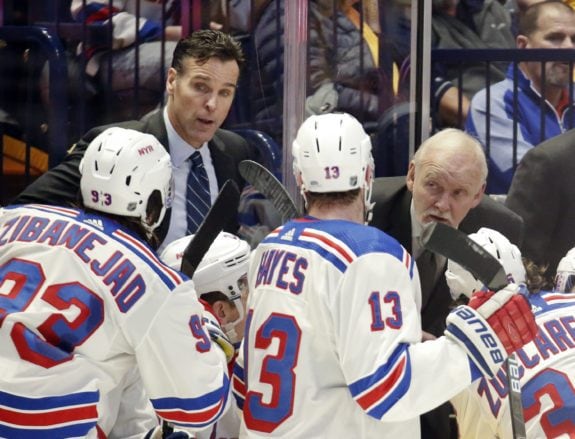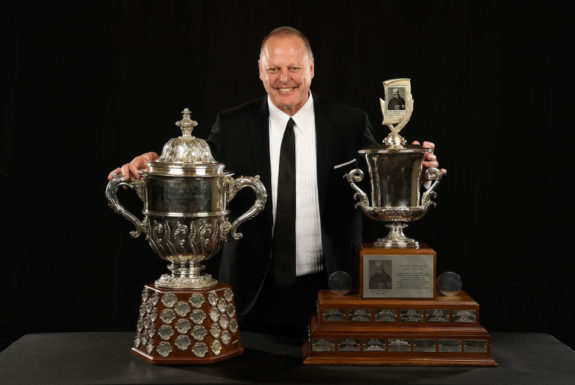For the first six games of the 2021-22 season, the New York Rangers’ much-hyped makeover looked stunningly complete. The Blueshirts, whose offseason personnel moves made them significantly bigger and stronger, overcame an 0-1-1 start by grinding their way to a 4-0 road trip, compensating for a lack of scoring by playing tight and doing enough to come away with victories in those four contests. The physical, north-south style that the team’s new management and coaching staff prioritized for this season seemed to have taken hold.
Then came game No. 7.
On Monday at home against the Calgary Flames, the Rangers of 2020-21 returned. Fancy passing drills in the offensive zone, multiple giveaways and poor defensive coverage led to a 5-1 loss – and could be reason for concern beyond a single game in a long season.
New coach Gerard Gallant deserves kudos for navigating plenty of issues in the season’s first month – an injury to forward Kaapo Kakko, center Ryan Strome landing in the COVID protocol, very slow starts from stars Artemi Panarin, Mika Zibanejad and Alexis Lafreniere, the Vitali Kravtsov saga – to help his club get off to a strong start. Yet Monday’s result could indicate that the veteran bench boss is about to face his biggest test so far.

For all the changes the Rangers underwent over the summer to add sandpaper and muscle, their top six forwards remain mostly the same – and that group was the chief culprit in last season’s steadfast refusal to adhere to the style that former coach David Quinn, like Gallant, wanted to play.
Quinn, of course, is gone now, a casualty of what was clearly a breakdown in communication and a fraying of his relationship with the team’s top guys up front. At times last season, it appeared those forwards were playing the east-west, overpassing offensive style that has become increasingly common on Broadway in recent years in sheer defiance of Quinn’s orders. At the very least, it was obvious that the team wasn’t at all interested in adopting the identity that their coach was asking for.
Gallant’s Hands-Off Approach Could be Coming to an End
The housecleaning that saw Quinn, general manager Jeff Gorton and John Davidson fired, Chris Drury promoted to president and general manager, and Gallant’s subsequent arrival, was supposed to mark the end of an era of “softness.” The new guys in charge had a mandate – one that stretched up to ownership – to transform a team that had far too long been determined to engage in a high-risk, high-reward, ultimately unworkable style of play.
Gallant was hired in part because he had a reputation as being more hands-off with veteran players, allowing them to police themselves, after numerous key Rangers hinted at being worn down by Quinn’s micromanaging way of doing business. What the Rangers also got in Gallant was a coach who’s consistent in what he expects and one that refuses to coddle players.

Again, Gallant is demanding the Blueshirts play the way Quinn wanted to as well. It’s possible the sloppy, undisciplined performance against the Flames, precisely the kind of big, heavy team the Rangers wanted to bulk up to compete with, was a function of playing seven games in 12 days as well as the long road trip. Exhaustion and mental fatigue may have crept in, leading to the uninspired performance.
Another such effort, however, will almost certainly force Gallant to react.
Related: Rangers Must Solve Problems With Stars After Quinn Firing
“We want to make those skilled plays all the time and there’s a fine line between making those skilled plays that work and those skilled plays that wind up in the back of our net on Grade A scoring chances,” he said after the loss. “We can’t make those mistakes. We got away with it in Toronto, but not (Monday).
“Those pucks that came from our defensemen to the half-wall and we lost those battles, that’s what I’m talking about. Too many times, it stopped at the blue line and went back into our zone. Those little fancy plays through your feet don’t work most of the time.” (From ‘Gerard Gallant Wants Rangers to Cut Down On Finesse Plays’, New York Post, 10/26/21)

One got the feeling that Gallant was restraining himself from fully expressing how he felt, the carefully-chosen language barely concealing his true level of annoyance – and essentially every player in the lineup that night deserved his ire. The former NHL winger is an old-school coach, and he’s not about to allow players to dictate the direction of the team.
Expect to see anyone who doesn’t comply with Gallant’s expectations of a straight-line, hard-working and defensively responsible approach nailed to the bench, or in the press box, in short order if the Rangers don’t get back to playing the way they did last week.
“I coached against the Rangers for a few years and you come in here and say that’s a good team on paper, skilled team,” Gallant said. “But you’ve got to get grittier.” (From ‘Alexis Lafreniere Not Shying Away From Rangers Coach’s Criticism’, New York Post, 10/26/21)
Therein lies the potential for a formidable challenge for the former Columbus Blue Jackets, Florida Panthers and Vegas Golden Knights coach. The Rangers have been moving ever further away from such an identity since the Black-and-Blueshirts days came to an end in the first half of the 2010s. That drift began, then accelerated, under Quinn’s predecessor Alain Vigneault. Quinn didn’t have the personnel, not to mention the NHL track record and subsequent respect in the dressing room, to reverse it.
Gallant Attempting Wholesale Transformation of Rangers’ Style, Culture
Gallant, in contrast, possesses all three. Yet accomplishing a sea change in long-established culture and on-ice methods might be a tad more difficult than just bringing in a bunch of new players in the offseason and telling the whole team to play a certain way. It might not be as easy as the Rangers made it look over the first six games.
Getting from 2020-21 to where team management and the coaching staff want to be in 2021-22 could prove messy, taking the form of benchings, public and private upbraidings, and whatever kind of tough love Gallant tends to apply. The part that’s at least somewhat worrisome, though, is that Quinn tried all that – albeit inconsistently at times – and got nowhere.
Gallant has never shied from such a task. He forged tough, tight-checking squads in his past three NHL stops, authoring a record of imposing his will on those clubs, and his established reputation and better-prepared roster put him in a more advantageous situation with the Rangers than Quinn enjoyed. His Jack Adams Award as coach of the year in 2017-18 – the same season he led the expansion Golden Knights to the Stanley Cup Final – carries plenty of heft amongst his players.

Even so, the path to the type of attitude and style Gallant desires might end up being substantially more arduous here than it was at any of his previous head coaching gigs. The coach is in essence starting anew in that area, trying to reprogram a club that’s been among the least physical in the NHL for a while now into one that’s known for its harder edge and conscientious play all over the ice. Is the impulse to engage in pretty plays that lead to opponents’ goals as often as they do to Blueshirts tallies part of the organizational DNA?
There could be plenty of work ahead for Gallant as he attempts to overcome that history and turn the Rangers back into a consistent playoff entrant.
The guess here is that Gallant will ultimately succeed where Quinn failed, the winds of change being at the current coach’s back after it became obvious the Rangers had to be remade in personnel and philosophy after last season. Players who don’t conform to that new reality, which so many appeared to embrace in the initial six contests, will likely find themselves watching the games instead of playing in them.
Major change, though, can be painful, and the progress toward it uneven. If Monday’s result proves to be more than a one-off, expect things around Gallant’s Rangers to get uglier before they get better.